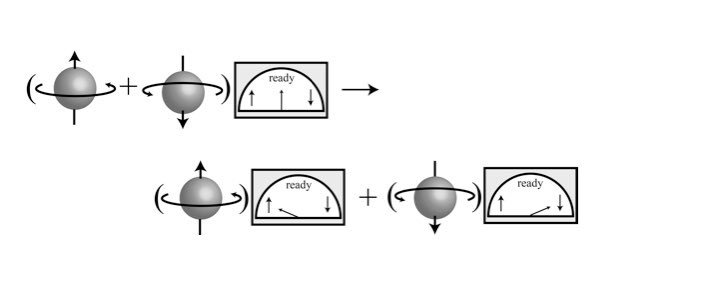en.wikipedia.org/wiki/Niels_Bohr
In this interpretation, we distinguish between microscopic quantum systems and macroscopic observers.
en.wikipedia.org/wiki/Wave_func…
The moment an observer measures a quantum system, that system’s wave function suddenly and unpredictably collapses, revealing some definite spin or whatever has been measured.
When we’re not looking at them, wave functions change smoothly according to the Schrödinger equation.
hyperphysics.phy-astr.gsu.edu/hbase/quantum/…
Now, back to Everett and his Many-Worlds theory...
Under Wheeler’s advice, Everett began thinking about quantum cosmology: the study of the entire Universe as a quantum system.
en.wikipedia.org/wiki/Quantum_c…
In addition, there will be only a single quantum state, described by what Everett called the ‘universal wave function’.
We also have a measuring apparatus, which according to Everett is a quantum system in its own right.
Imagine that it can be in superpositions of three different possibilities:
It can have measured the spin to be down,
Or it might not yet have measured the spin at all (which we call the ‘ready’ state).
The fact that the measurement apparatus does its job tells us how the quantum state of the combined spin + apparatus system evolves according to the Schrödinger equation.
Good news is that we already know everything we need.
The rules of quantum mechanics are clear:
Again, the world has ‘branched’ into a superposition of these two possibilities.
Both of those parts of the final superposition are actually there. But they can’t interact with each other; what happens in one branch has no effect on what happens in the other.
This is the secret to Everettian quantum mechanics. We didn’t put the worlds in; they were always there, and the Schrödinger equation inevitably brings them to life.
The traditional remedy has been to monkey with the fundamental rules of quantum mechanics in one way or another.
Consciousness, in particular, has nothing to do with it.
In an early draft of his thesis, Everett used an analogy of an amoeba dividing to illustrate the branching of the wave function:
He had not lived a healthy lifestyle, over-indulging in eating, smoking and drinking.
“I realise that there is a certain value in my father’s way of life. He ate, smoked + drank as he pleased, and one day he just suddenly and quickly died...
/End








